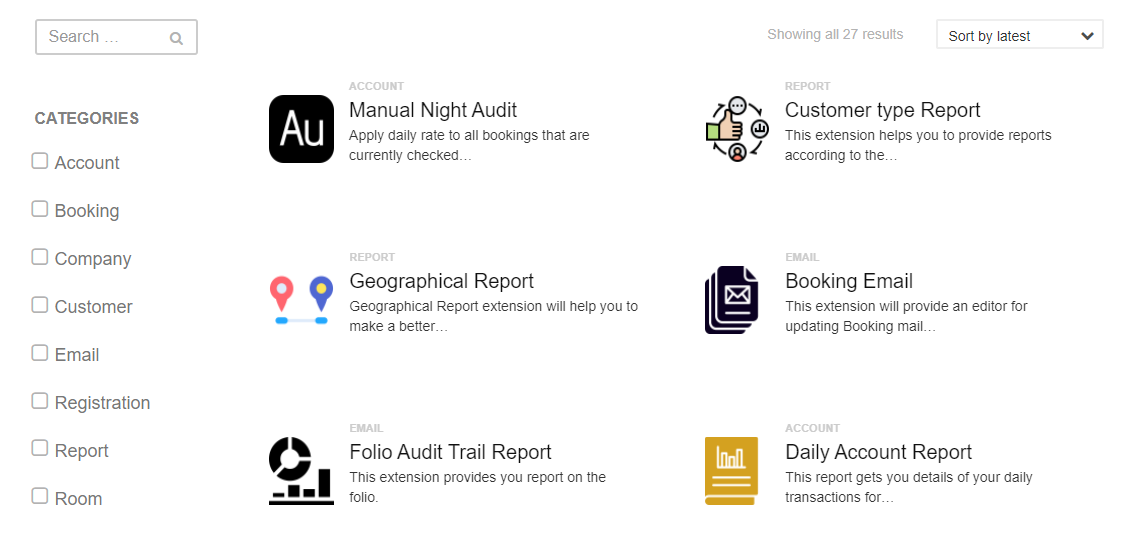Open-source PMS (http://www.minical.io)
- What is miniCal?
- Features
- Documentation
- Installation
- Demo
- Code of conduct
- Contribute
- How to develop an extension
- Join the Community
- miniCal Marketplace
- Versioning
- License
miniCal is an open-source PMS (Property Management System). It was originally designed for hotel software companies, but other businesses like car rental businesses can use it also.
We see hundreds of PMS companies developing the same features and integrations as everyone else, and we think it's a waste of resources. Our mission is to develop a single best technology that can perform better than most PMS companies' in-house developed products, and completely take the technical burden off of their shoulders.
miniCal documentation is available here minical.doc.
- Online Booking Engine : Accept online bookings from 3rd party websites.
- Inventory : Control room availabilities of your property.
- CRM : Manage customer profiles along with their account balances.
- Intuitive Calendar : Simple interface that provides quick overview of your property.
- Payment : Accept secure payments online.
...and plenty more extensions to add from our marketplace !
- Fork the repository
https://github.com/minical/minicalor clone it locally. - Install the stable version of PHP 7.4.0, MySQL 5.0.4, and OS-specific dependency tools.
- Create a MySql database with any name.
- Do the basic configuration updates on the public->build.json file.
- Create a new file named ".env" by copying the .env.example file which is located in the root.
- Update database credentials in .env file in .env file
- Set Environment variable to either 'development' or 'production' in .env file
- Update Project URL (Url pointing to a public folder in minical project like http://localhost/minical/public) in .env file
- Update API Url (Url pointing to API folder in minical project like http://localhost/minical/api) in .env file, for more details check the .env example.
- Install composer dependencies by running the "composer install" command on your project root.
- Install miniCal Database by going to
http://localhost/minical/public/install.phpin your browser, following the installation steps, and create an admin account. - That's it. You are done! Visit miniCal at
http://localhost/minical/public
Visit miniCal Demo.
miniCal follows Codeigniter Style Guide.
Any contribution for a new feature or an improvement will be appreciated.
- Fork the repository and edit.
- Submit the pull request, please provide a comprehensive description of PR as a commit message.
- Any pull request that the reviewers don't find useful to miniCal will be rejected. We recommend you to talk to us first before working on a PR. Also, please ensure your code is following Codeigniter Style Guide.
Do you have an idea of an extension that might be a great addon to the miniCal community? Follow Extension development guide.
Get support. exchange ideas with our growing dev community. Join us on Discord.
Explore the extension of miniCal on miniCal Marketplace.
The version is broken down into 4 points e.g 1.2.3.4 We use MAJOR.MINOR.FEATURE.PATCH to describe the version numbers.
A MAJOR is very rare, it would only be considered if the source was effectively re-written or a clean break was desired for other reasons. This increment would likely break most 3rd party modules.
A MINOR is when there are significant changes that affect core structures. This increment would likely break some 3rd party modules.
A FEATURE version is when new extensions or features are added (such as a payment gateway, shipping module, etc). Updating a feature version is at a low risk of breaking 3rd party modules.
A PATCH version is when a fix is added, it should be considered safe to update patch versions e.g 1.2.3.4 to 1.2.3.5


